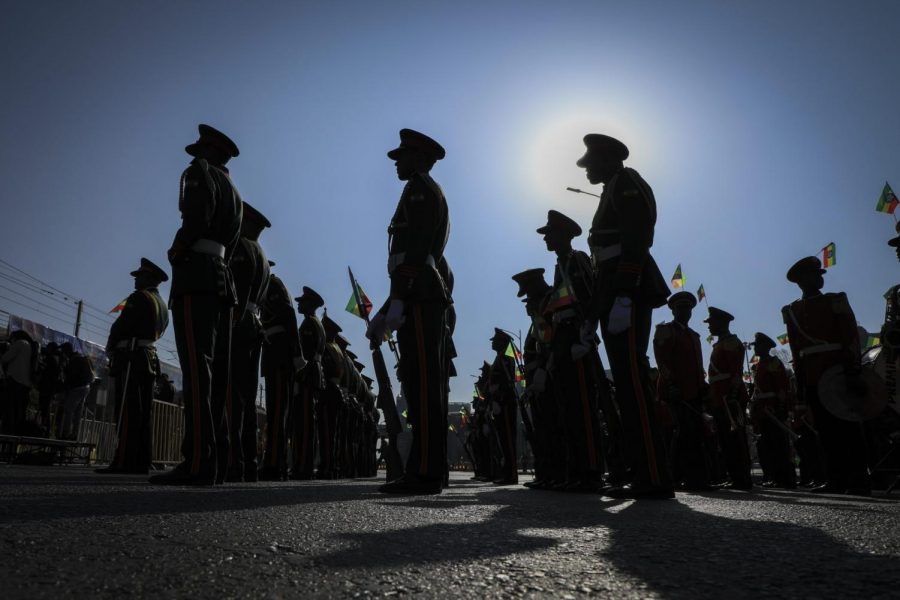U.S. Sanctions Eritrea’s military, ruling party over Ethiopia
Ethiopian Military parade at a rally organized by local authorities in support of the Ethiopian National Defense Force.
NAIROBI, Kenya (AP) — The United States on Friday imposed economic sanctions on the military and ruling party of Eritrea over their role in neighboring Ethiopia’s brutal yearlong war, and it warned it would sanction Ethiopia’s government and rival Tigray forces if there is no “meaningful progress” toward a cease-fire and talks.
A Treasury Department statement cited the “continued role” the Eritreans play in the war that has killed thousands and displaced millions. Ethiopia’s government allowed Eritrean soldiers to enter Ethiopia’s Tigray region, where witnesses have accused them of some of the war’s worst abuses, but then denied the soldiers were there for months.
The U.S. statement noted “numerous reports of looting, sexual assault, killing civilians, and blocking humanitarian aid” by Eritrean forces. The soldiers “have been seen disguised in old Ethiopian military uniforms, manning checkpoints, obstructing and occupying critical aid routes, and threatening medical staff in one of northern Ethiopia’s few operating hospitals,” the statement said.
Notably, the Treasury Department pointed out that Eritrea’s military is led by longtime President Isaias Afwerki, but he was not sanctioned.
The department also warned that “if there is not tangible progress toward a cessation of hostilities,” the U.S. was ready to sanction others, including Ethiopia’s government and the Tigray forces who long dominated the national government before a political falling-out with Prime Minister Abiy Ahmed.
There was no immediate comment from Eritrea, which human rights groups have described as one of the world’s most repressive nations.
In a separate statement, U.S. Secretary of State Antony Blinken said Eritrea’s presence in Ethiopia is “posing a significant obstacle to a cessation of hostilities, and threatening the integrity of the Ethiopian state.” He called again for Eritrean soldiers to withdraw immediately.
Blinken said the U.S. was not imposing sanctions on Ethiopia’s government and the Tigray forces “to allow time and space” to see if efforts by African Union envoy Olusegun Obasanjo to urge them into talks without preconditions make progress.
Without “meaningful progress,” Blinken said, such sanctions could be imposed.
In separate comments to reporters, he expressed concern that Ethiopia, Africa’s second most-populous country, could “implode.” Blinken spoke before he visits neighboring Kenya next week as part of efforts to calm the crisis.
The U.S. sanctions imposed Friday also targeted Abraha Kassa Nemariam, the head of the Eritrean National Security Office; Hidri Trust, the holding company of the Eritrean ruling party’s business enterprises; the Red Sea Trading Corporation, which managed the ruling party’s financial interests; and the corporation’s chief executive, Hagos Ghebrehiwet W. Kidan.
Ethiopia’s war has created one of the world’s worst crises. Hundreds of thousands of people face famine conditions in the Tigray region under what the United Nations has called a “de facto humanitarian blockade.”
“People are dying because of lack of supplies,” World Health Organization Director-General Tedros Adhanom Gebreyesus told reporters Friday, calling the blockade “systemic.”
Tedros, a former Ethiopian foreign minister under the previous government, also accused Ethiopia’s current government of ethnic profiling and detaining people by the thousands.
“This is blatant and open,” he said.
Witnesses have told The Associated Press that ethnic Tigrayans, including American and British citizens, are being swept up in a new wave of detentions since Ethiopia’s government imposed a state of emergency last week as Tigray forces moved closer to the capital.







